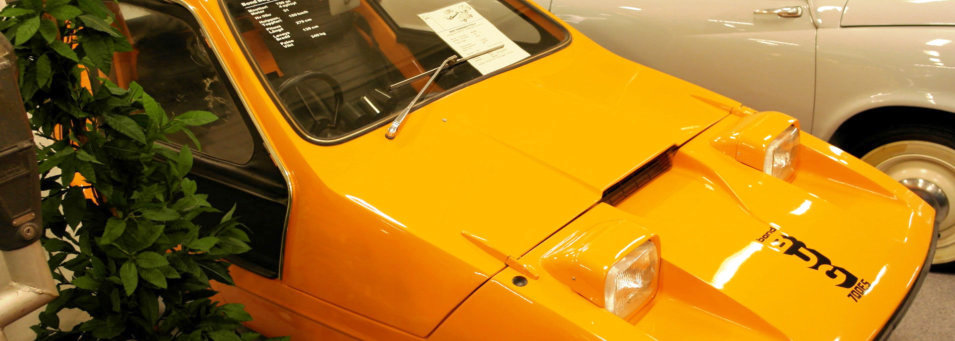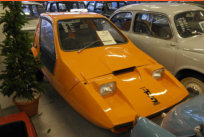




Only 2270 cars made between 1970 to 1974

Bond Bug ES 700 - 1973
The Bond Bug is a small British two-seat, three-wheeled
sports car built from 1970 to 1974.
It is a wedge-shaped microcar, with a lift-up canopy and side screens instead of conventional doors. Following the purchase of Bond Cars Ltd., Reliant commissioned Tom Karen of Ogle Design to design a fun car. The Bond Bug was based on Chief Engineer John Crosthwaite's newly designed chassis and some Reliant Regal running gear. The original concept was explored by chopping down a production Regal vehicle, the rear of the car being shortened to end over the rear axle. This prototype could be seen for many years later, languishing in the yard at the rear of the factory, by anyone who cared to look through the chain-link fence from the canal towpath. The engine is the front-mounted 700 cc (later uprated to 750 cc) Reliant light-alloy four-cylinder unit, developed from the Austin 7, and which protruded into the passenger cabin. At launch 29 bhp (22 kW; 29 PS) was claimed for the less expensive 700 and 700E models. The more up- market 700ES incorporates a redesigned cylinder head which permitted the compression ratio to be increased from 7.35:1 to 8.4:1. This provided a power increase to 31 bhp (23 kW; 31 PS) as well as improved torque for the then range topping 700ES. The Bond Bug 700ES also offers more supportive seats as well as more padding over the engine cowl, twin mudflaps, an ashtray, a rubber front bumper and a spare wheel. The car enjoyed an upbeat launch, at which Reliant's Ray Wiggin stated: "The fact it has three wheels is quite incidental. It's a new form of transport. So now, in fact, we think it's going to appeal to a much wider section of the market than we originally envisaged." The Bug was available in a bright orange tangerine colour, although six white Bugs were produced for a Rothmans cigarette promotion - one of which was also used in an advertisement for Cape fruit and at the moment a Dulux Bond Bug is said to be under commission. Its fame was helped along by a distinctive Corgi Toys die-cast toy car. Although it had a fairly short production run (1970–1974), it has a dedicated following today. In contrast to the image of three-wheeled Reliants as being slow, the Bond Bug was capable of some 76 mph (126 km/h), in excess of the UK national speed limit (70 mph/102.6 km/h), and comparable to small saloon cars such as the basic 850 cc Mini (72 mph/106 km/h) and the Hillman Imp (80 mph/117 km/h). However, it could not match the speed of the Mini Cooper S (96 mph/141 km/h) or larger saloons such as the Ford Cortina Mark III (104 mph/152.5 km/h in the highest-powered variant), or even aging models of two-seater sports cars, such as the MG MGB (103 mph/151 km/h) or the Lotus Seven, where by 1970 even the lowest-powered version of the S4 could reach 108 mph/158.4 km/h. The Bond Bug was sold as being fun to drive, with the low seating position giving a similar exaggerated impression of speed as in a go-kart, while the actual speed was similar to that reached by high performance cars only a few years earlier (indeed, earlier versions of the Lotus 7 had a top speed of 76 mph/111 km/h right up until 1968, and their trim level, e.g. side curtains instead of windows, was also similar). The Bug was, however, no cheaper than more practical cars. It cost £629, while a basic 850 cc Mini, a four-seater much faster round corners but with considerably inferior acceleration, cost £620. Also, while a basic Lotus Seven (with much faster acceleration and good cornering) cost £945 in 1970, it was also available as a complete knocked down kit much more cheaply, partly because of more favourable tax treatment. Throughout the new millennium, the car has enjoyed an increased following through publicity with appearances from stars such as Robbie Williams in the "Millennium" promo and the infamous 118 guys.
1973
Engine 700 cc 4 cylinders Power 31 HP Top speed 150 km/h Lenght/width 2,79 m/1,39 m Weight 340 kg The collections Bond Bug is in fine original condition, Ready for a spin.
Photos mainly by Matti Kreivilä. Historical facts and technical details of the vehicles provided by Wikipedia. Movies YouTube.




- Autobianchi Transformable - 1960
- Autobianchi Familiare - 1962
- Autobianchi Panoramica - 1962
- Autobianchi Cabriolet - 1963
- BMW Isetta 300 - 1956
- BMW Isetta 300 - 1959
- BMW Isetta Standard
- BMW 600 - 1959
- Bond Bug ES 700 - 1973
- Fiat Topolino - 1936
- Fiat Topolino - 1939
- Fiat Topolino - 1951
- Fiat Belvedere - 1952
- Fiat Topolino - 1954
- Fiat 600 - 1955
- Fiat 500 - 1963
- Fiat 500 - 1969
- Fiat Multipla - 1965
- Fuldamobil 4-wheel - 1958
- Fuldamobil King S7 - 1959
- GLAS Isar T700 - 1962
- Goggomobil T400 - 1959
- Goggomobil T250 - 1961
- Goggomobil T250 - 1969
- Goggomobil Coupe
- Heinkel Kabine - 1959
- Honda N600 - 1970
- Jalta Saporoshez - 1967
- Lloyd Alexander TS - 1960
- Messerschmitt KR200 - 1960
- Messerschmitt KR201
- Messerschmitt KR200 - 1963
- Messerschmitt KR200 - 1964
- NSU Prinz I - 1958
- Scootacar Mk3 - 1963
- Steyr-Puch 500 -1961
- Steyr-Puch 650 - 1964
- Trabant P 50 - 1961
- Trojan 603/198 - 1964
- Trojan 3-wheeler - 1964
- Trojan 3-wheeler - 1964
- Vespa 400 - 1959
- Victoria Spatz 250 - 1957
- ZŁndapp Janus - 1959


- About Scooters
- Apollo moped
- Cezeta 175 - 1960
- Heinkel Tourist - 1960
- Lambretta 125 - 1953
- Puch SR 150 - 1958
- Pyrkijš moped
- Suzuki Burgman 400
- Tunturi City - 1980
- Vespa 150 - 1959
- Yamaha Passola 50 - 1980
- ZŁndapp Bella w. sidecar - 1960
- ZŁndapp Bella 204 - 1960
- ZŁndapp Bella 200 Deluxe - 1963
- ZŁndapp Combinette



















